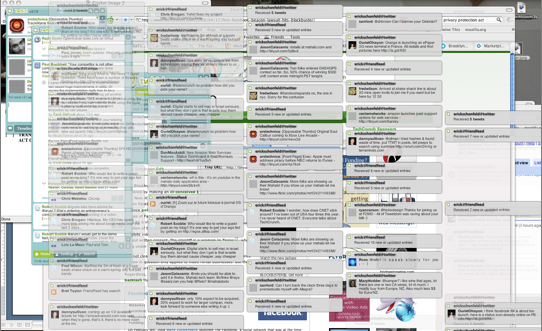It’s my own damn fault. I should have never listened to Mike. This morning I installed Twhirl on my desktop in a failed attempt to keep up better with Twitter and Friendfeed. I was hoping it would help me manage the never-ending flow of information from those two services—which, I admit, I’ve been increasingly ignoring. Instead, it took over my desktop and I couldn’t make it stop (see image above).
Twhirl solves one problem (the need to constantly visit the Twitter and Friendfeed Websites), only to create another one (information overload that clutters your desktop). I’m sure there is some setting I could change to fix the issue, but this highlights a bigger problem with the Web today. There is too much to pay attention to and not enough ways to reduce the noise. Even Robert Scoble, the biggest Twitter whore on the planet who follows 21,000 people and receives one Tweet per second, can’t deal with it anymore.
And it is not just Twitter. Lifestream aggregators like Friendfeed are supposed to make things simpler by consolidating the activities of everyone you know across the Web into one single view. But every day a new lifestream aggregator pops up to the point that it’s gotten to be ridiculous. Now, desktop utilities like Twhirl and Alerty Thing are taking these services out of the browser so that they are always on your desktop.
But if you think it is hard enough to keep up with e-mails and instant messages, keeping up with the Web (even your little slice of it) is much worse. Putting Twhirl on your desktop and hearing the constant “ding” of new messages coming in will make you realize that this is IM on steroids. (You will quickly turn off the sound).
Bringing all of this Web messaging and activity together in one place doesn’t really help. It reminds me of a comment ThisNext CEO Gordon Gould made to me earlier this week when he predicted that Web 3.0 will be about reducing the noise. (Some say it will be about the semantic Web, but those two ideas are not mutually exclusive). I hope Gould is right, because what we really need are better filters.
I need less data, not more data. I need to know what is important, and I don’t have time to sift through thousands of Tweets and Friendfeed messages and blog posts and emails and IMs a day to find the five things that I really need to know. People like Mike and Robert can do that, but they are weird, and even they have their limits.
So where is the startup that is going to be my information filter? I am aware of a few companies working on this problem, but I have yet to see one that has solved it in a compelling way. Can someone please do this for me? Please? I need help. We all do.
